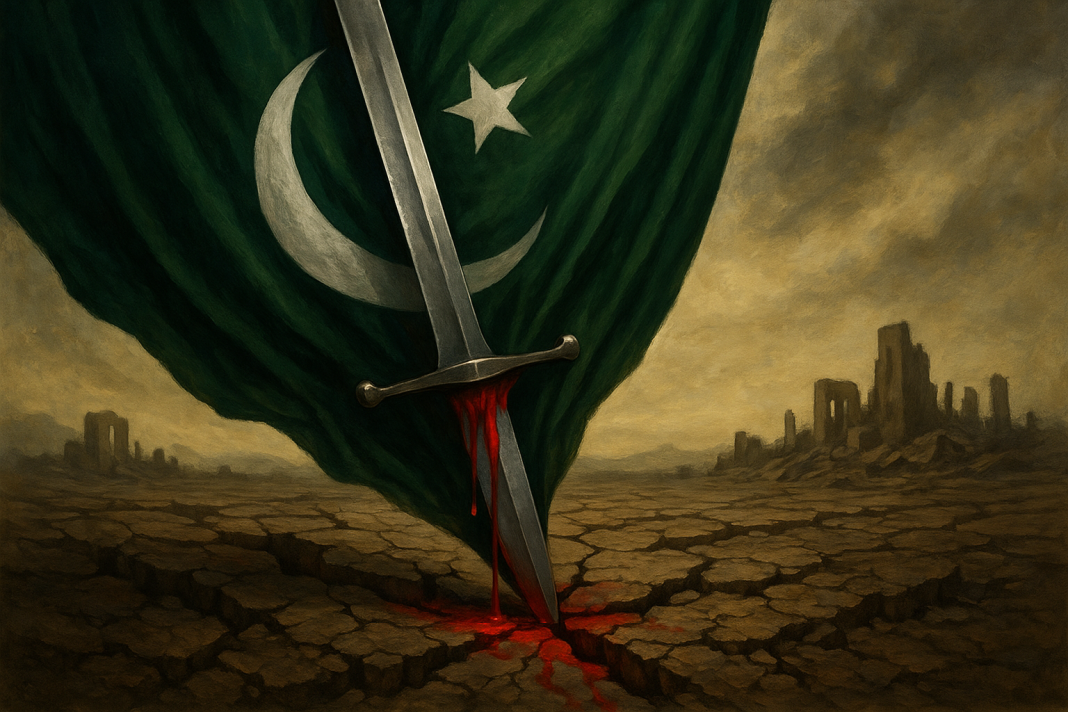Sword cuts through the veil,
Truth bleeds from a broken land,
Freedom waits in shards
With a heavy heart and much reluctance, I, a wanderer of both blade and thought, pen this reflection on the state of Pakistan. The conclusion is stark: there is little justification for the continued existence of this state as it stands today.
Few dare to voice this openly, for Pakistan has long been cloaked in the garb of Muslim identity and sovereign pride. Yet, beneath this veneer lies a troubling reality. This state is not the organic fruit of its people’s will but a construct of colonial cartography, etched by British hands to serve imperial whims rather than the aspirations of those who dwell within its borders. Born not of democratic fervor but of the slow retreat of colonial power, Pakistan emerged as a brittle edifice, riddled with contradictions, that has not and will not serve its people.
Read More: The Judge Cannot Erase His Shame
Far from being a bastion of Islam or a champion of Muslim dignity, the Pakistani military establishment, the mercenary upper echelons, has been complicit in acts that betray every moral and ethical principle. Its history is stained with acts that defy morality:
- In 1971, the slaughter in East Pakistan saw over 200,000 civilians perish in a brutal campaign to preserve a faltering unity, a wound that still festers in the memory of millions.
- The state’s complicity in the massacre of some 15,000 Palestinians in Jordan in 1970 reveals a betrayal of Muslim solidarity, entangled as it was in the cold calculus of regional geopolitics.
- Its continual interference in Afghanistan, particularly during the War on Terror, contributed to the deaths of countless Afghans, destabilizing a neighboring muslim nation in the service of great power machinations. In the process, it slaughtered many thousands in Waziristan.
- In Balochistan, indigenous voices are silenced with state terror, their dissent met with violence rather than dialogue.
- Most recently, the heartbreaking bloodshed in Tirah, where seven innocent protesters were gunned down in cold blood, exposes the state’s growing willingness to turn its blades inward.
Though the heartland may yet seem spared, the trajectory is clear: a state that devours its own is a state on the path to ruin.
This decaying structure is propped up by an elite triumvirate—military officers, bureaucratic mandarins, and landed-industrial magnates—who treat the nation as a wellspring of extraction. These parasitic rentiers thrive not on justice or progress but geopolitical rents, patronage networks, and cynical alliances.
Their latest gambit, whispers of normalizing ties with Israel, stems not from the principle of furthering peace in the region, but from a desperate bid to secure fresh capital to sustain their grip on power. Such maneuvers reveal a truth: this elite serves only itself, not the people it claims to protect.
One is compelled to ask: Is this state a blessing or a curse? Is this particular construct—of ideas, governance, or control—a pathology or a remedy? The tyranny of Pakistan’s state apparatus points to the latter. To fracture this blot on humanity into its constituent parts may offer its peoples a chance at justice, dignity, and peace—ideals long denied by the mercenary custodians of the status quo.
Pakistan today is not a homeland but a prison, not a shield for the faithful but a siege against them. An honest reckoning with history and politics demands the posing of the painful question. If the democratic will of the people cannot be granted, is the demise of this state, before it consumes all in its wake, the only path to redemption left for its people?
Miyamoto Musashi carves through the chaos of markets and power, wielding a pen as sharp as his blade. A veteran of the financial dueling grounds, decades spent as an I-banker and pol. Strategist, he now stalks the shadows of economics and governance, exposing cowardice and cutting down complacency.














